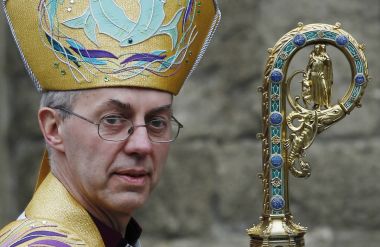Justin Welby and John Sentamu warn that Church of England must reverse its decline

The Archbishops of Canterbury and York have warned that decline in the Church of England has to be reversed if it is to continue its nation-wide ministry.
In a paper prepared in advance of the forthcoming General Synod meetings next month, Most Revs Justin Welby and Dr John Sentamu say: "The urgency of the challenge facing us is not in doubt. Attendance at Church of England services has declined at an average of 1 per cent per annum over recent decades and, in addition, the age profile of our membership has become significantly older than that of the population. Finances have been relatively stable, thanks to increased individual giving. This situation cannot, however, be expected to continue unless the decline in membership is reversed."
Average attendance at Sunday services has dropped by nearly half during the last 40 years and currently stands at around 800,000.
The archbishops also warn of a coming crisis in clergy staffing levels, saying: "The age profile of our clergy has also been increasing. Around 40 per cent of parish clergy are due to retire over the next decade or so. And while ordination rates have held up well over recent years they continue to be well below what would be needed to maintain current clergy numbers and meet diocesan ambitions."
Of the Church's 16,200 church buildings, 12,500 are listed. Of all England's Grade I listed buildings, 45 per cent are cathedrals and churches. The archbishops say that the "burden of church buildings weighs heavily" on congregations. They add that there is "no central investment in reaching out into the digital and social media world" and say: "If the Church of England is to return to growth, there is a compelling need to realign resources and work carefully to ensure that scarce funds are used to best effect."
The two archbishops praised four task group report calling for administrative changes in the Church in different areas, due to be debated by the Synod next month. They also signalled the possibility of an injection of funds from the Church Commissioners to enable reforms to be carried out, saying: "If all the above has to be done within the confines of current funding there will be a long period before its impact can be real, not least given the need to support dioceses through the transition from the present way in which national funds are distributed."
They concluded: "We believe that these reports, to be discussed in February, provide a basis for developing and delivering a major programme of renewal and reform within the Church of England as a matter of urgency."











